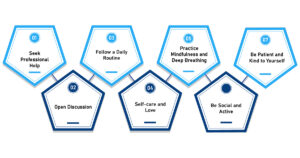Depression is challenging for people to understand that their ideas are not real, which in turn increases their negative emotions. At times, you get irritated or upset about things that normally wouldn’t bother them. To put it simply, is depression a disability? Here, we’ll find the answer to it.
Similarly, when depression restricts you from working, looking after yourself, or taking care of daily duties, it is often seen as a disability. Getting proper care and treatment from mental health professionals, friends, and family will help you improve your mood and health. You do not need to go it alone and getting help from experts can speed your recovery. Stay will us till the end of the article and get useful information and insights!
Is Depression Considered a Disability?
Yes, if someone’s depression gets severe day-to-day living and work, it may be seen as a restriction. Some help may be available to the individual, such as being approved for time off work, getting medications, or applying for disability payments. Similarly, a person who is depressed does not always mean they are considered disabled by law.
Furthermore, most cases of mild depression are resolved quickly with meetings with a doctor or with medication. Suppose someone deals with ongoing or very intense issues such as sadness, a lack of energy, trouble focusing, and feelings of hopelessness. Therefore, getting some professional mental health expert is vital to manage its signs and severity level. You might wonder about: is depression a disability. Thus, you may consult a doctor or a mental health psychiatrist who will help you receive the proper treatment. So, contact us at MAVA Behavioral Health for mental health treatment.
Signs of Severe Depression
There are a few that a person observes during depression episodes. These signs might include:
- Persistent melancholy or feelings of emptiness
- Loss of interest in previously liked activities
- Fatigue or lack of energy, especially after resting
- Difficulty in focusing and remembering things
- Appetite changes or severe weight loss/gain.
- Physical aches and pains with no obvious reason
Causes of Severe Depression
1. Genetics and Family History
Depression, especially in its severe form, exhibits a familial pattern, which suggests that if relatives suffer from it, there is an increased probability that a given person will also suffer from it. The genes may affect the functioning of a brain’s structure for mood and stress. This does not mean that all people with a history of depression in their families will suffer from depression, but there is an increased probability.
2. Brain Chemistry and Hormonal Imbalance
At times, damage to the brain caused by chemicals, mainly serotonin, dopamine, and norepinephrine, may lead to depression. If a person’s thyroid or hormone levels in menopause change, it can cause depression. Medicines might have to be given to address the conditions and rebalance the body to get rid of the symptoms.
3. Traumatic Life Events
Dealing with the death of a loved one, suffering abuse, getting a serious illness or going through a tragic breakup can result in serious depression. If we do not handle emotional trauma well, the brain may simply not be able to function properly.
4. Chronic Stress and Lifestyle Factors
Insufficient sleep, physical inactivity, and a non-healthy diet may intensify how you feel. These factors affect our health little by little and can make depression worse. Simple changes in your habits can make you feel better and less stressed out.
Is Anxiety and Depression A Disability?
Is depression considered a disability? Yes, anxiety and depression may be classified as disabilities in an individual’s daily life activities. If working or studying self-care activities are difficult to manage, then it can be classified as a disability. This implies that they are legally able to receive some assistance or other resources to help them deal with these conditions and improve their quality of life. So, the question; does depression counts as a disability is clear now.
However, not all individuals suffering from anxiety or depression will qualify as disabled. Doctors would consider both the extent of symptoms and their effect on how the individual handles daily tasks to decide on the course of treatment. Even when someone has mild anxiety or depression, they may be able to carry on their daily duties without help. Hence, for individuals who suffer from more serious anxiety and depression, classifying these conditions as disabilities ensures necessary support and treatment.
You may also like to read: Tips to Manage High-Functioning Depression
Is Depression a Short-Term Disability?
Yes, it is when someone dealing with depression is considered a short-term disability. Consider these main points:
- If depression stops you from working for a certain period, short-term disability insurance might help.
- A licensed healthcare provider must give you a clinical diagnosis.
- Your symptoms or problems should prevent you from doing your job.
- You must usually be off work for several days (often 7–14) before you are entitled to benefits.
- You should have medical documents such as treatment records and a note from the doctor.
- A typical policy lasts between 3 and 6 months, depending on the insurance you get.
Can You Get Disability for Depression?
You might think, can you get disability for anxiety and depression? Yes, you can get disability for depression; everything seems too much, so don’t hesitate to discuss it with your psychiatrist. They can assist you in coping with stresses you face, such as the disability process.
- If you do not agree with the denial because of your medical situation, income, where you live, or other reasons, you are allowed to ask for a reconsideration. Someone new from the SSA who did not take part in the original decision will examine your case.
- You can ask for a hearing with an administrative law judge who has not been engaged with your case if you are not pleased with the reconsideration by the SSA.
- Should the administrative law judge dismiss your hearing, you can request the Appeals Council to reconsider your case. The council will consider all your requests and might reject your appeal if the commission finds the administrative law judge to have acted properly.
- If the council deals with your case, they may decide or transfer your appeal to a new administrative law judge.
Is Depression a Disability-7 Tips to Manage

1. Seek Professional Help
If you are feeling depression very intensely, reaching out to a doctor or therapist is a good choice. They have the skills to cheer you up, suggest ways to feel better and give you medicine when needed. Quick help can make it so that things do not become more serious. They will keep an eye on your condition by repeating checks on you. Asking for help can be very important.
2. Open Discussion
The difference of having loved ones around you can be very significant. Learning that other people care is a source of hope. Having support enables you to cope with tough situations.
3. Follow a Daily Routine
If you have a schedule set, it gives you a sense of control. Make an effort to get up, eat, and go to bed at the same hours every day. Breaking your day into small jobs helps you feel less stressed. Routine makes your time valuable and relieves you from stress during the day. Having some easy routines can make you feel more solid.
4. Self-care and Love
Keeping yourself healthy is more than just taking care of your body. Having a good diet, adequate rest, and regular exercise can help reduce your mental stress. Even simple exercises help to make anxiety symptoms lighter and give you a better mood.
5. Practice Mindfulness and Deep Breathing
The exercises are a unique approach to dealing with stress since it focuses on your thoughts. Daily mindfulness practice can lower stress levels and allow for higher levels of peace during difficult times. Devoting just a few minutes to this can show major improvements.
6. Be Social and Active
It can get hard to make an effort to change your daily routine, but spending time outdoors and around other people will surely assist in overcoming any sadness. One can start by doing responsibilities that make them feel accomplished, such as small tasks.
7. Be Patient and Kind to Yourself
It takes a while to overcome strong depression, and you may encounter some steps forward and some steps back. Bear in mind that everyone makes errors, and you shouldn’t be too critical of yourself all the time. Celebrate the little things you do each day to reach your dream.
Can You Get Disability for Depression?
Is depression a disability? Yes, you may be eligible for disability benefits if your sadness is very severe and impairs your capacity to work or perform daily chores. You could be entitled to Social Security Disability payments if you have been afflicted with depression for at least 12 months and your therapy isn’t very effective.
In addition, if you want to qualify, you must have documents from your doctor or hospital visits. It is also important to show how depression holds you back from your work or managing your daily tasks. When you are found to have a severe case of depression, they may provide you with regular financial assistance.
Closing Thoughts
Is depression a disability? Certainly, a person can be considered disabled by depression if it is very severe and lasts a lot of time. It may become difficult to do your job, stay on task, manage daily activities, or feel happiness. People with severe depression may grow very despairing, feel exhausted, or have trouble performing as usual. Should their condition significantly impair their capacity to live normally and no change is observed with treatment, they may be considered for disability benefits.
At MAVA Behavioral Health, our psychiatrists assist patients who are dealing with depression. We handle treatment by prescribing medicine and holding frequent consultations. Our mental Health psychiatrists try to decline depression and begin the process of recovery and a better future.
FAQs
Is depression considered a disability at work?
People with depression can consider it a disability according to the ADA or similar laws if it significantly affects major activities like their jobs. Employers usually need to fit accommodations for people working with depression.
Can depression be a disability?
Yes, if someone’s depression impairs daily activities or work duties, they may qualify as a disabled person. Whether the illness counts as a disability relies partly on the length and severity of symptoms.
What to tell a psychiatrist to get disability for depression?
It is important to be open and factual about how depression impacts your everyday routine and job capacity. Outline the symptoms you are experiencing (such as fatigue and unease), explain how long they have gone on, and describe the effect they have on your activities.
How to get out of deep depression?
Getting out of major depression might help if you lend an ear to someone reliable. Try to do something light every day; for example, go out or do something fun.









